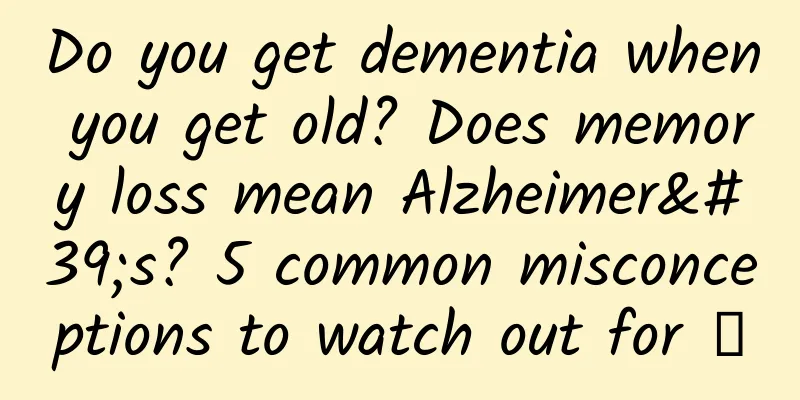Do you get dementia when you get old? Does memory loss mean Alzheimer's? 5 common misconceptions to watch out for →

|
September 21st of each year is World Alzheimer's Day. With the intensification of the aging trend, the incidence of Alzheimer's disease is rising year by year. Many elderly people may experience memory loss and frequently forget objects or things in their daily lives. These seemingly "old and confused" daily episodes are often downplayed by themselves and their families. Little do they know that this may be an early manifestation of Alzheimer's disease and deserves high attention. Many people refer to Alzheimer's disease as "senile dementia", but this term is not only inaccurate, but also brings shame to people, and even causes many people to be unwilling to be diagnosed or show early signs of dementia, thus missing the best treatment period. We urge everyone to stop using the term "senile dementia" to refer to such patients! There are also many myths about Alzheimer's disease: Is it something that only affects older people? Is it something that causes brain atrophy? Are these true? Today, we will analyze several common Alzheimer's disease rumors one by one to help everyone better understand Alzheimer's disease. Copyrighted stock images, no reproduction is authorized 1. Is brain atrophy Alzheimer's disease? Here we need to clarify their respective concepts: "Alzheimer's disease" is a neurodegenerative disease with a slow onset and worsening over time. It is mainly manifested by progressive cognitive decline and brain atrophy, and the main manifestation of brain atrophy is the atrophy of the medial temporal lobe and hippocampus. "Brain atrophy" refers to the reduction in the volume of cells (neurons) in brain tissue under the influence of various factors. In addition, it is not a specific disease, but a neuroimaging manifestation of many diseases. At present, the exact cause of Alzheimer's disease is still unclear. Scientists believe that it may be the result of the combined effects of genetics, lifestyle and environmental factors. Brain atrophy is divided into two types: physiological brain atrophy and pathological brain atrophy. Physiological brain atrophy occurs naturally as people age. According to relevant research, after the age of 35, the human brain will begin to slowly shrink and continue at a rate of 0.2% per year. When it reaches the age of 70, the rate of atrophy will accelerate. In addition to the factor of aging, the progress of brain atrophy will also accelerate due to genetics, brain trauma, excessive smoking and drinking, gas poisoning and other reasons. Therefore, the two cannot be equated. Copyrighted stock images, no reproduction is authorized 2. People who love spicy food are more likely to develop Alzheimer’s disease? There is a study circulating on the Internet, which states that if a person consumes more than 50 grams of chili peppers per day, his risk of memory and cognitive impairment will be twice that of an average person. Many people who love spicy food are worried about this: How can eating spicy food have this negative effect? In fact, there is no need to worry too early, as this study itself has many flaws. The most important problem is that it does not control the variables well and ignores the fact that the pain sensation of "spicy" does not exist alone in people's eating habits. For example, the famous Sichuan snack, spicy beef, contains a lot of oil and sugar in addition to being spicy. What we really need to prevent is not the spiciness, but the high salt, oil and sugar hidden behind the spicy food. High fat can lead to obesity and various cardiovascular diseases, excessive salt intake can also cause kidney disease, and excessive sugar intake may also lead to diabetes, all of which are causes of Alzheimer's disease. Therefore, there is no big problem with spicy food itself, but people who like spicy food should pay attention to whether its partner is healthy enough. 3. Does Alzheimer’s disease only affect the elderly? Many people are used to calling Alzheimer's disease "senile dementia". In fact, this popular term is not accurate. Although most patients with Alzheimer's disease develop the disease after the age of 65, 4% to 5% of patients develop the disease before the age of 65, which is called early-onset Alzheimer's disease. There was a report on the Internet that a Chinese woman was diagnosed with this disease at the age of 36. Because many people equate it with "old age", it is easy to ignore the abnormal conditions in their bodies. If you have the following situations, it is best to go for professional testing: 1. You are usually very capable, but suddenly you are in a hurry and lose your regularity. 2. You forget very important things and can't remember them even after being reminded by others. 3. You get lost in an environment that you used to be very familiar with and don't know what day it is today. 4. You become more and more taciturn and speak incoherently, such as saying "I'm fine" instead of "hello" when saying hello. Copyrighted stock images, no reproduction is authorized 4. Does memory loss mean you have Alzheimer’s disease? Where are the glasses I just took off? Why did I forget to take my keys again today? What is the 6-digit number in the SMS verification code? Whenever we experience these moments, we can't help but wonder: Is my brain so bad at such a young age? Is it really Alzheimer's disease? Although one of the main characteristics of Alzheimer's disease is memory decay, the reverse is not necessarily true. The hippocampus and cerebral cortex of Alzheimer's patients will shrink. Among them, the hippocampus is responsible for the storage, conversion and orientation of short-term memory, while the frontal lobe, parietal lobe, temporal lobe, needle lobe and limbic system in the cerebral cortex control cognitive ability, somatic sensation, long-term memory, emotional processing and many other human functions. Therefore, Alzheimer's patients will not only have short-term "amnesia", but also lose the ability to recognize time and place, the ability to take care of themselves and the most basic language ability. If you only forget something occasionally and can suddenly remember it with a little reminder from others, it is normal in most cases. There are actually many factors that affect people's memory deterioration, such as the most important point: rest. There is research support that lack of sleep can lead to reduced memory. Some people may say that they get enough sleep, but you may have overlooked one point: listening to music with headphones on before falling asleep, or looking at your phone before going to bed will keep your brain active. Your eyelids are closed, but your brain does not get enough rest. Copyrighted stock images, no reproduction is authorized 5. Will Alzheimer's disease definitely be inherited among relatives? Alzheimer's disease is divided into two forms, sporadic and familial. The latter can indeed be inherited to future generations. However, this does not mean that as long as the elderly in the family suffer from Alzheimer's disease, the offspring will suffer from "familial" Alzheimer's disease. Its definition is much more complicated. Geneticists have found that familial Alzheimer's disease is an autosomal dominant inheritance, in which the three pathogenic genes are: APP/PSEN1/PSEN2. They often cause people to become ill before the age of 50 and show a family inheritance phenomenon. But there are not many such cases. At present, the vast majority of Alzheimer's patients in the world are sporadic. Copyrighted stock images, no reproduction is authorized How to prevent Alzheimer's disease? Alzheimer's disease is a neurodegenerative disease that cannot be cured after onset, and the average life expectancy is only three to nine years. At present, its pathogenesis is still unclear, but according to existing research, we can indeed pay more attention to it in our daily lives to reduce the possibility of its arrival. 1. Insist on moderate exercise, including endurance and strength training. Some researchers believe that this will help establish new connections between brain cells and prevent memory loss. 2. Maintain a healthy diet and control the proportion of fat, salt and sugar. Obesity, high blood pressure, diabetes, etc. are all causally related to Alzheimer's disease to a certain extent. A study observed and studied 392 pairs of twins over the age of 65 (each pair of twins had at least one Alzheimer's patient), and finally concluded that in the case of almost identical genes, lifestyle and environmental factors do interfere with the possibility of developing Alzheimer's disease. References [1]Li, https://doi.org/10.1186/s12888-020-02537-9 [2]Todd, Stephen; Barr, Stephen; Roberts, Mark; Passmore, A. Peter. Survival in dementia and predictors of mortality: a review. International Journal of Geriatric Psychiatry. 2013, 28(11): 1109–1124 [3]Iliffe, Steve; Burns, Alistair. Alzheimer's disease. BMJ. 2009-02-05, 338: b158 [4] Lucey, BP, Mccullough, A., Landsness, EC, Toedebusch, CD, & Holtzman, DM. (2019). Reduced non-rapideye movement sleep is associated with tau pathology in early alzheimer's disease. Science translational medicine, https://doi.org/10.1126/scitranslmed.aau6550 [5]Lu L, Yu [6] Lane CA, Hardy J, Schott JM. Alzheimer's disease. Eur J Neurol. 2018 Jan;25(1):59-70. doi: 10.1111/ene.13439. Epub 2017 Oct 19. PMID: 28872215. [7]How to Know if You Have a Genetic Risk for Alzheimer's retrieve frtomhttps://www.nytimes.com/2022/11/23/well/alzheimers-disease-genetic-risk.html [8] General Office of the National Health Commission. Lu Lin, Yu Xin, Li Lingjiang, Wang Gaohua, & Wang Gang et al. (2021). Guidelines for the diagnosis and treatment of Alzheimer's disease (2020 edition). General Practice Clinical and Education, https://doi.org/10.13558/j.cnki.issn1672-3686.2021.001.002 Author: Li Mi, popular science creator Review | Li Jingjing Professor and Chief Physician, Department of Neurology, Beijing Tiantan Hospital |
<<: Common diseases and prevention in autumn: an interesting dialogue with nature
Recommend
What to do if hazelnuts get damp? How to prevent hazelnuts from getting damp
Hazelnut, also known as mountain chestnut, pointe...
What are the methods to prevent ectopic pregnancy?
Ectopic pregnancy is a very common disease. When ...
What ointment to use for vaginal itching
Vaginal itching is a common disease. Female patie...
How many months should pregnant women drink corn silk water
Corn silk is a Chinese herbal medicine that has t...
Women are more likely to suffer from gynecological diseases if they are under too much stress
It turns out that gynecological diseases are not ...
Is vomiting yellow water bile?
Morning sickness is the most uncomfortable reacti...
Drinking water makes you fat and your menstrual irregularities are caused by this! ——Ten misconceptions about polycystic ovary syndrome (Part 1)
Irregular menstruation and gaining weight even af...
Why is the vaginal discharge green and yellow?
When you find that the leucorrhea is green and ye...
Does the thyroid affect menstruation? Gynecologists tell you the answer
If a person's thyroid hormone secretion is ab...
Is it good for women to drink lemon every day?
Lemon is a food rich in vitamin C and a very fres...
What is the disease of women's scalp pain?
Women have to juggle work and family in their dai...
Lin Meimei having a wheezing attack
This is the 5154th article of Da Yi Xiao Hu Prefa...
HootSuite: Social media ad spending to exceed $173 million in 2022
General Social Advertising Statistics Social medi...
Can I have another abortion if I get pregnant again after one month of abortion?
If there is a plan to conceive, it is recommended...
What causes heart pain in women
A woman's heart pain may be caused by chest c...









